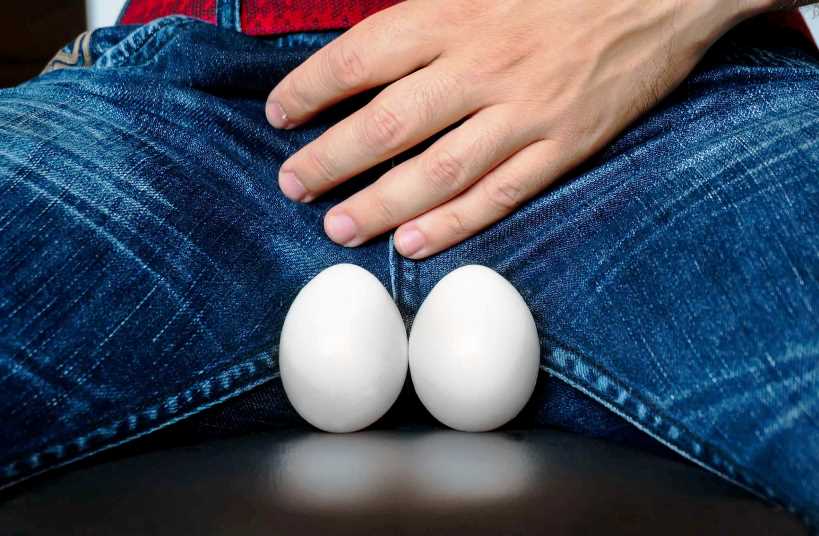Have you ever wondered what it would be like to make some extra cash by donating a testicle? Sounds crazy, right? Well, believe it or not, there are actually clinics across the US that will pay you for your donation.
With the cost of health care in the US continuing to rise and with more people needing help paying for treatments such as in vitro fertilization (IVF) than ever before, it makes sense that there are a growing number of fertility clinics willing to pay donors substantial amounts of money just for donating their testicles.
At first glance, donating a testicle for money sounds like an extreme move — after all most of us won’t even consider selling plasma — let alone part of our anatomy!
However, if you look past the shock value there are some legitimate reasons why someone may decide going down this route is their best available path in life. Most notable is that there are quite simply no other ways available where you can make money using your body without doing very much in return.
This article will discuss;
- How donating your testicle will help.
- Where to donate your testicles when needed.
- We’ll also take a look at the pros and cons of donating a testicle for money.
- How much you can get paid and how safe or risky the procedure is.
Our goal also includes offering responses to inquiries like
- Can you donate a testicle after vasectomy?
- Can I sell my left testicle?
This article aims to provide information and shed light as well as dispel any misconceptions surrounding the topic of testicle donation also known as testicular tissue transplantation.
Understanding Testicle Donation: An Overview of the Practice.
Firstly, it’s important to understand why testicle donation is so valuable. Testicles are an essential part of the male reproductive system, producing sperm and hormones that are crucial for fertility and overall health.
Unfortunately, some men may suffer from medical conditions or injuries that result in the loss of one or both testicles. By donating your testicles, you have the opportunity to help these individuals regain their quality of life and achieve their dreams of starting a family.
Donated testicles can also be used for medical research purposes, such as the development of new treatments for testicular cancer, infertility, and other conditions that affect male reproductive health.
In addition to medical research, testicle donation is also used in certain therapeutic contexts. For example, some transgender men undergoing gender-affirming surgery may choose to receive a donated testicle transplant to maintain hormonal balance and preserve fertility.
Before deciding to donate your testicles, you’ll need to meet certain eligibility requirements. Typically, donors must be between the ages of 18 and 35, in good overall health, and free of any sexually transmitted infections or bloodborne diseases. You’ll also need to undergo a thorough medical screening process to ensure that your testicles are suitable for donation.
Once you’ve been cleared for donation, the procedure typically involves extracting one or both testicles through a small incision in the scrotum under local anesthesia, which usually takes less than an hour to complete followed by a brief recovery period.
While there are risks associated with any surgical procedure, the risks involved with testicle donation are generally minimal. Donors may experience some minor discomfort and swelling following the procedure however, most donors are able to resume their normal activities within a few days.
It’s important to note that testicle donation is a highly personal decision that should not be taken lightly. Thus it is important to discuss any potential risks with your doctor beforehand and ensure that you fully understand the implications of the procedure.

A donation is when you give your kidney to another person in need. A similar thing occurs with testicles; many males who need a testicle removed refer to their donated balls as “donated”.
Some words in common usage for testicle donation include “donation,” “surgery,” and “removal.” Still, others refer to this surgery as “balls-in-a-box” because doctors take out only one ball at a time and put it in a container while they remove the other ball.
How Much Do You Get for Donating a Testicle?
Now to the big question “How much can you donate a testicle for?”
Even up to $3000! Well, that depends on how long you have to be under anesthesia. Guys who donate two balls (for example) receive about $1000 for each ball.
Of course, the longer you are in surgery, the more money you can make by donating your ball. You don’t get the money directly from the hospital, though; it has to go through an agency that will take care of everything.
Here is a list of agencies that take care of the money for you
- The Hounslow and Haringey Testek Trust,
- The Southern California Ball Donation Program,
- The National Kidney Federation Donor Information Line
- The National Donor Registry of the New Jersey Urological Society (NJ). org/donorservices/donation.pdf. This is a PDF document that needs to be printed out and given to your surgeon if you want to donate a testicle in New Jersey.
Common Side Effects Of Not Getting Tested Out There
Loss of Sexual Function. It depends on the surgeon.
In general, the younger a man is when his testicles are removed, the better his function will be after surgery. However, if someone does not get his testicles checked out before he turns 30 (which is when they usually happen), this can sometimes cause a loss of sexual function.
It is determined by age.
Many men who have the surgery lose part or all of their ability to achieve an erection and ejaculate. This means they can no longer ejaculate during sex while having an orgasm or after masturbating. They often can’t maintain an erection either. This is because your surgeon must cut the main blood vessels that bring blood to the testicles. Without the blood supply to their testicles, they will die and be nonfunctional.
It Depends on Your Diet
Testosterone supplements have been used for many years to treat low testosterone levels, but some studies suggest that these supplements may actually cause heart disease in men when combined with high cholesterol levels. This can be a big problem for men who have also undergone surgery for testicle removal and still require testosterone therapy.
Vitamin Abundance
Though surgery to remove testicles may offer a solution to a number of other medical problems, the treatment is not risk-free.
For decades, various scientific studies have shown that too much vitamin A can cause serious health problems such as liver failure and bone disease.
People who take too much vitamin A are also more likely to develop tumors in their bodies. This is what makes many people who have had cadaveric testicle implants worried that they might not have enough natural testosterone in their bodies; tests show evidence of vitamin A depletion in these men.
Let’s talk about the pros.
The Pros of Getting Testes Removed
- Extremely low chance of cancer. If you have had your testicles removed, there is a much lower risk of developing testicular cancer or any other type of cancer. The surgical removal of your testicles leaves the scrotum (the bag containing them) totally empty. This means that there are no more sebaceous glands that would normally produce and secrete oils, keeping the skin moist and healthy. Without this, the skin dries out and becomes brittle, making it more prone to infection and disease.
- Reduced risk of testicular torsion, a condition in which the testicles become twisted or stuck to the abdominal wall. This can cause extreme pain and permanent damage.
- The removal of these two tubes (or both) from your scrotum leads to a much more relaxed appearance than if you were born with these tubes in place. You will not be able to feel them anymore.
- The removal of the tubes reduces the chance of getting a hernia or other abdominal disorder. Many men who have testicle implants and then go through a surgical procedure speak to us about how much easier it is to move. There is no bag left in your scrotum (like there would be if you hadn’t had surgery), so there is literally nothing hanging from your body, which provides an incredible amount of freedom and ease in movement.
- A more relaxed appearance results in less anxiety about personal appearance and fewer feelings of self-consciousness. Many men who have had their testicles removed are amazed at how well they look without the bags hanging from their groin.
- You will still develop secondary sex characteristics such as a beard or mustache and facial hair growth on your body. This can make you look more masculine, leaner and older. It is a nice change in appearance after going through puberty!
The Cons of Getting Testes Removed
- High risk for several medical conditions: Chronic Pain, Anal Fissure, Hemorrhoids, and Rectal Prolapse are examples of rare chronic illnesses (other than cancer).
- Removal of the testes has also been found to increase the risk of depression. This is because it lightens someone’s mood and makes men more confident, which, in turn, makes them less likely to contemplate self-harm or suicide.
- Though some surgeons say that their patients report a much better quality of life after the surgery, other doctors have found that these men are prone to sickle cell anemia after the surgery and, in some cases, have died from this condition.
- There is a high likelihood that you will find yourself without testosterone therapy after your testicles are removed. The only way you can get it is if you go through testosterone therapy replacement, which can be costly to your insurance company and body.
- The surgical removal of testes also increases a man’s chance of developing osteoporosis and other bone-related conditions. This is because the bones in your leg and pelvic region are not as strong as they used to be. Without a testicle or two, the bones will become thin and brittle over time, making it easier for you to break or fracture them during an accident. You will want to talk to your doctor about ways you can strengthen these areas so that they remain healthy as ever!
Frequently Asked Questions on Donating Testicles
1. Who should consider a testicular implant?
Testicular implants are commonly used as a treatment for male infertility. A lot of men will lose one or both of their natural testicles in an accident sometime in life. However, this doesn’t mean that they can no longer go on to have a child with the woman they chose to marry or be in a long-term relationship with. Due to the fact that each of a man’s testicles contains about 75 million sperm cells, it usually isn’t difficult for them to get back on track once an artificial testicle has been implanted.
2. Is there a way to tell if a man’s natural testicle has been removed or replaced?
The good thing about testicular implants is that they have a very realistic appearance and feel. Most people who see the man won’t be able to tell that his normal-looking orb isn’t actually real.
However, there are some people who have been trained to be able to identify it with just the touch of their hands.
You should consult with your doctor if you have concerns about this, or go through a few training sessions yourself if you feel compelled to explore the idea of being able to tell whether a person has had this surgery or not.
3. What are the benefits of testicular implants?
The main benefit of a testicular implant is that it allows a man to impregnate a woman without having to worry about having a real one.
The artificial one will perform all of the same functions as a normal testicle, making it easy for him to conceive and grow a healthy fetus in his body.
It may take some time for him to get back on track, but if he can get an artificial testicle implanted, he will have no problem impregnating the woman he loves.
Final Thoughts on Making Money by Donating a Testicle
Though some men do not realize that their testicles have been removed until years after their surgery, the surgery to remove your testicles is one of the most common operations performed in modern medicine.
In most cases, it should be considered a viable option when considering different treatment options for prostate cancer or testicular cancer.
It’s important to note that testicle donation is a highly specialized procedure that requires careful screening of potential donors to ensure their physical and mental health.
Donors must meet strict criteria regarding age, medical history, sexual activity, and drug use. They must also undergo a series of tests to determine their eligibility and compatibility with the intended recipient.
However, you should discuss removing your testicles with an expert before you decide to go ahead with the surgery. It is important to know what risks you face and what benefits you will reap if you choose this option.
Additionally, no matter which medical professional you consult, you should make sure that they understand your concerns and questions during the process (whether by phone or in person).






![How and Where to Sell Feet Pics Online [2024 Guide]](https://onlineincomezeal.com/wp-content/uploads/2020/11/sell-feet-pictures-and-get-paid-make-money-online-fast-selling-feet-pics-Apps-to-sell-feet-Pics-e1686678225393-768x504.jpg)